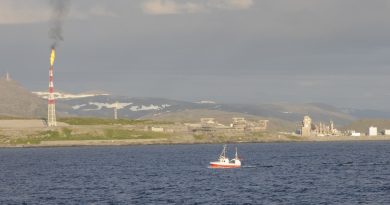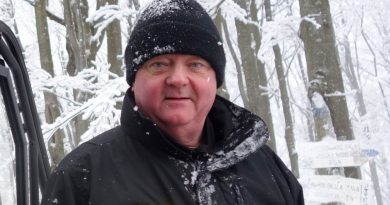Summit calls for Pan-Arctic climate change monitoring

A large gathering of Arctic scientists, politicians, indigenous peoples, and other observers and stakeholders are calling for a pan-Arctic climate change monitoring system.
Maribeth Murray (Ph.D) is a professor of Anthropology and Archaeology and Executive Director of theArctic Institute of North America at the University of Calgary in Alberta was one of the organizers of the summit meeting.
Maribeth Murray (Ph.D) is a professor of Anthropology and Archaeology and Executive Director of the Arctic Institute of North America at the University of Calgary in Alberta was one of the organizers of the summit meeting:
Held this year in Fairbanks, Alaska, the bienniel gathering is known as the Arctic Observing Summitand this third edition saw some 450 people from 30 different countries attending.
As Professor Murray says, the idea is to develop a pan-Arctic integrated system to monitor and record what’s happening across the circumpolar region.
They say the variety of current tracking tools from remote stations, to satellites should be increased and augmented with community-based observers. This would be to fill in many of the data gaps while also increasing data gathering. They also seek to centralize and make readily available the variety of data collected.
A portion of the conference statement reads that in addition to the extremely rapid biological, physical, and human changes to this northern region of the world,,” The Arctic is also an integral element of the larger Earth system. Arctic change is contributing to global sea level rise and is expected to lead to environmental and weather changes in mid- and lower latitudes, thereby affecting millions of lives and having significant social, economic and political impacts. As a result, Arctic Change is moving to the forefront of scientific and societal concern.”
The forum makes several recommendations of which inclusion and participation of indigenous peoples are a major component. These include for example:
– Develop international principles and protocols that establish ethical guidelines for research, for the involvement of Arctic Indigenous Knowledge holders… to define observational needs, and to plan, prioritize, implement, and use sustained observations.
– Propose to the highest levels of government, the business case for a comprehensive pan-Arctic observing system. This proposal should assess the costs and demonstrate the benefits for society at various levels.
– Coordinate the implementation of a pan-Arctic observing system with regional and global observing initiatives, and organize efforts in securing resources for its sustained operation through the leadership of the Sustaining Arctic Observing Networks (SAON) initiative.
– Prioritize, on an ongoing basis, observations that should be started and maintained over the long-term by operational and other relevant agencies
– Work, through the SAON Arctic Data Committee, to develop a broad, globally connected Arctic observing data and information “system of systems” based on open-access data and standards, in addition to recognizing and addressing ethical use and proprietary rights of Indigenous knowledge that delivers value to Arctic and global communities.
Professor Murray says with the scale and speed of change in the Arctic, it is an urgent issue, and a global issue as change in the Arctic has clear repercussions in southern latitudes and delay now will only make it more difficult to deal with the consequences in future.
Related stories from around the North:
Canada: Canadian study looks at Arctic beetles as climate change markers, Radio Canada International
Finland: Warm Easter predicted across Finland… even for Lapland, Yle News
Greenland: Changing Sea Ice: The Ripple Effect (VIDEO), Eye on the Arctic
Norway: 2014 warmest year in history for Norway, Barents Observer
Sweden: Storm Helga weather warning for Sweden, Radio Sweden
United States: Arctic’s ‘startling’ winter warmth ‘milepost’ say scientists, Alaska Dispatch News


